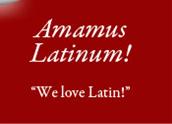Students at CCA study both Latin and Spanish. We study Latin, because as the “DNA of Western Civilization,” it opens up many doors of learning and is in fact advance learning in many subjects. Latin serves as a “paradigm discipline” through which students learn the structure of language–the Latin language, the English language and, ultimately, all language. Since Latin is the source of over half our English words, Latin study greatly enhances one’s English vocabulary. Often, just one Latin word is responsible for several English words. Take for example, the Latin word porto (I carry). From this word are derived port, portal, porter, porch, airport, import, transport, export, report, and portable. In this case one Latin word helps yield ten English words–a pretty good investment.

Latin
also helps students understand grammar. As they learn Latin grammar,
they are also learning or reinforcing their knowledge of English
grammar. Our own way of labeling and analyzing English grammar evolved
from Latin grammar. Words such as verb, noun, adjective, adverb
are all Latin words developed to describe Latin language! Latin is
logical, straightforward and highly regular, making it an ideal
language for learning grammar principles that apply to many other
languages including, of course, English.
Studies repeatedly show that Latin study increases mastery of English. SAT and GRE (Graduate Record Exam) scores rise. In fact, students earning the highest scores on the verbal section of the GRE are not English majors but Classics majors. Anyone wanting to see the hard, statistical facts demonstrating the value of Latin study is encouraged to visit the website of the National Committee for the Study of Latin and Greek
Beginning foreign language study at a young age has always been the classical way and is proven wise by experience. Students acquire language quickly. Our students learn foreign languages with far greater ease than adults would.
Latin is also the mother tongue of the “Romance languages”–Spanish, Portuguese, French, Italian, and Romanian. These are called “Romance languages” because they directly descended from the language of the Romans–Latin. While half of our English words come from Latin, up to 90% of the words in these languages come from Latin. Porta in Latin means door; Puerta in Spanish means door. Amicus in Latin means friend; in Spanish and Portuguese it is amigo, in Italian amico, in French ami, in Romanian amic. When a student learns Latin, he does advance work in these Latin-derived languages.
